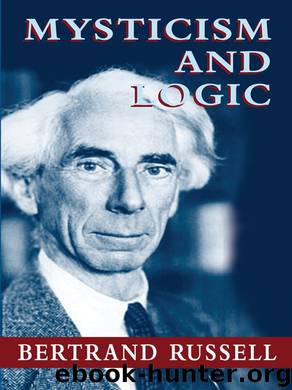Mysticism and Logic by Bertrand Russell

Author:Bertrand Russell [Russell, Bertrand]
Language: eng
Format: epub
ISBN: 9780486171128
Publisher: Dover Publications
Published: 2012-10-14T16:00:00+00:00
The Ultimate Constituents of Matter23
I WISH to discuss in this article no less a question than the ancient metaphysical query, “What is matter?” The question, “What is matter?” in so far as it concerns philosophy, is, I think, already capable of an answer which in principle will be as complete as an answer can hope to be; that is to say, we can separate the problem into an essentially soluble and an essentially insoluble portion, and we can now see how to solve the essentially soluble portion, at least as regards its main outlines. It is these outlines which I wish to suggest in the present article. My main position, which is realistic, is, I hope and believe, not remote from that of Professor Alexander, by whose writings on this subject I have profited greatly.24 It is also in close accord with that of Dr. Nunn.25
Common sense is accustomed to the division of the world into mind and matter. It is supposed by all who have never studied philosophy that the distinction between mind and matter is perfectly clear and easy, that the two do not at any point overlap, and that only a fool or a philosopher could be in doubt as to whether any given entity is mental or material. This simple faith survives in Descartes and in a somewhat modified form in Spinoza, but with Leibniz it begins to disappear, and from his day to our own almost every philosopher of note has criticised and rejected the dualism of common sense. It is my intention in this article to defend this dualism; but before defending it we must spend a few moments on the reasons which have prompted its rejection.
Our knowledge of the material world is obtained by means of the senses, of sight and touch and so on. At first it is supposed that things are just as they seem, but two opposite sophistications soon destroy this naïve belief. On the one hand the physicists cut up matter into molecules, atoms, corpuscles, and as many more such subdivisions as their future needs may make them postulate, and the units at which they arrive are uncommonly different from the visible, tangible objects of daily life. A unit of matter tends more and more to be something like an electromagnetic field filling all space, though having its greatest intensity in a small region. Matter consisting of such elements is as remote from daily life as any metaphysical theory. It differs from the theories of metaphysicians only in the fact that its practical efficacy proves that it contains some measure of truth and induces business men to invest money on the strength of it; but, in spite of its connection with the money market, it remains a metaphysical theory none the less.
The second kind of sophistication to which the world of common sense has been subjected is derived from the psychologists and physiologists. The physiologists point out that what we see depends upon the eye, that what we hear
Download
This site does not store any files on its server. We only index and link to content provided by other sites. Please contact the content providers to delete copyright contents if any and email us, we'll remove relevant links or contents immediately.
| Anthropology | Archaeology |
| Philosophy | Politics & Government |
| Social Sciences | Sociology |
| Women's Studies |
The remains of the day by Kazuo Ishiguro(8945)
Tools of Titans by Timothy Ferriss(8346)
Giovanni's Room by James Baldwin(7299)
The Black Swan by Nassim Nicholas Taleb(7086)
Inner Engineering: A Yogi's Guide to Joy by Sadhguru(6775)
The Way of Zen by Alan W. Watts(6575)
Asking the Right Questions: A Guide to Critical Thinking by M. Neil Browne & Stuart M. Keeley(5737)
The Power of Now: A Guide to Spiritual Enlightenment by Eckhart Tolle(5723)
The Six Wives Of Henry VIII (WOMEN IN HISTORY) by Fraser Antonia(5484)
Astrophysics for People in a Hurry by Neil DeGrasse Tyson(5169)
Housekeeping by Marilynne Robinson(4420)
12 Rules for Life by Jordan B. Peterson(4292)
Double Down (Diary of a Wimpy Kid Book 11) by Jeff Kinney(4252)
The Ethical Slut by Janet W. Hardy(4232)
Skin in the Game by Nassim Nicholas Taleb(4223)
Ikigai by Héctor García & Francesc Miralles(4219)
The Art of Happiness by The Dalai Lama(4114)
Skin in the Game: Hidden Asymmetries in Daily Life by Nassim Nicholas Taleb(3973)
Walking by Henry David Thoreau(3938)
